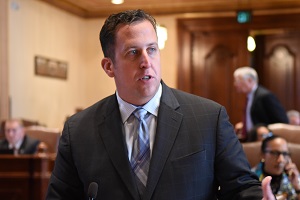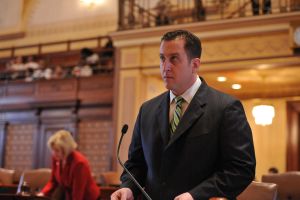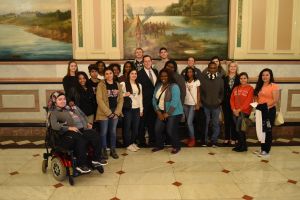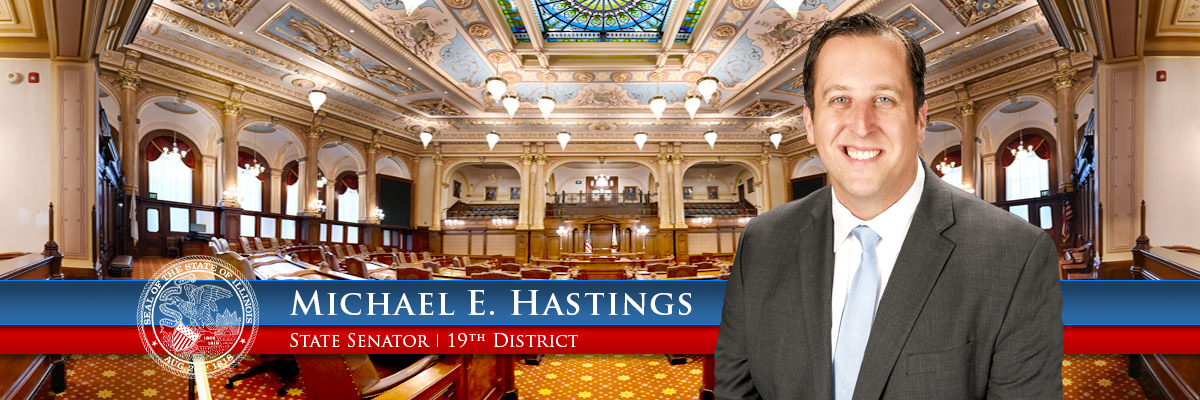- Details
- Category: Press Releases
 SPRINGFIELD- For many disabled veterans, the stress of rising property taxes simply adds to a long list of physical and mental ailments they face. Last summer, State Senator Michael E. Hastings (D-Tinley Park) co-sponsored a plan that would ease the property tax burden on them. Under the proposal, veterans can reduce their EAV by $2,500 to $5,000 off their property tax bill while some could even have their property exempted from property taxes.
SPRINGFIELD- For many disabled veterans, the stress of rising property taxes simply adds to a long list of physical and mental ailments they face. Last summer, State Senator Michael E. Hastings (D-Tinley Park) co-sponsored a plan that would ease the property tax burden on them. Under the proposal, veterans can reduce their EAV by $2,500 to $5,000 off their property tax bill while some could even have their property exempted from property taxes.
Senate Bill 107 was signed into law in August of last year, and the Cook County Assessor’s office will have the application paperwork available on the Cook County website later this month. Senator Hastings will be hosting a town hall to help veterans complete and turn in the paperwork before the March 2 deadline.
The first town hall will be on Tuesday, February 9 from 6:00 p.m. to 8:00 p.m. at Rich South High School, 5000 Sauk Trail, Richton Park, IL 60471.
The second town hall will be on Monday, February 22 from 11:00 a.m. to 1:00 p.m. at the Orland Park Civic Center, 14750 S. Ravinia Avenue, Orland Park, IL 60462.
“I want to bring all of the veterans in the area together with representatives from Cook County so that everyone who needs to fill out the proper paperwork does so on time,” Hastings said.
The proposal provides for the following property tax exemptions to be implemented:
• If a veteran has a service connected disability of 30-50 percent, their annual exemption is $2,500
• If a veteran has a service connected disability of 50-70 percent, their annual exemption is $5,000
• A veteran who has a service connected disability of 70 percent or more their property is exempt from taxing
• Prevents any accessibility improvements that are made to disabled individuals’ residential properties from increasing the assessed value of the property.
- Details
- Category: Press Releases
 SPRINGFIELD- State Senator Michael E. Hastings (D-Tinley Park) issued the following statement after the governor delivered his State of the State address on Wednesday afternoon:
SPRINGFIELD- State Senator Michael E. Hastings (D-Tinley Park) issued the following statement after the governor delivered his State of the State address on Wednesday afternoon:
“Starting his speech by attacking hardworking union men and women in the south suburbs was inappropriate. I believe a leader should unite the people rather than divide them.
“Our state is struggling without a budget, our social service and higher education institutions are at the brink of collapse.
“However, I do applaud the governor on his initiatives to modernize the state IT infrastructure to save money and streamline the process. I also applaud him on increasing partnerships between high school and community colleges to increase student job training and allow them to step into better careers; this is an initiative I have been working on for three years.
“I am committed to working with anyone to improve Illinois, but more importantly I am committed to improving the south suburbs.”
- Details
- Category: Press Releases
 SPRINGFIELD- With the state entering its seventh month without a budget in place, State Senator Michael E. Hastings (D-Tinley Park) is focused on ensuring that the state keeps its obligation to Illinois school districts. The former School District 230 Vice President reached out to the governor, comptroller and chairman of the State Board of Education to stress the importance of General State Aid to education funding, and asked that they make school funding payments a priority.
SPRINGFIELD- With the state entering its seventh month without a budget in place, State Senator Michael E. Hastings (D-Tinley Park) is focused on ensuring that the state keeps its obligation to Illinois school districts. The former School District 230 Vice President reached out to the governor, comptroller and chairman of the State Board of Education to stress the importance of General State Aid to education funding, and asked that they make school funding payments a priority.
“During such a tumultuous time in Springfield, committing to our students is a bipartisan, common sense decision,” Hastings said. “Our schools need this money, and it should be a guarantee for them. That’s what I communicated in my correspondence with the governor.”
Some schools districts in the 19th district and across Illinois have already had to enact cost saving measures in past months. The Lincoln Way School District 210 board voted in August to close Lincoln-Way North High School in an attempt to regulate the districts’ financial status.
“It was absolutely heartbreaking to see friends, families and classmates being pulled apart when Lincoln-Way North closed,” said Hastings.
“People in my district are sick of the quality of education constantly suffering. They want a guarantee as to the state’s commitment to them, and that’s what they deserve,” Hastings said.
- Details
- Category: Press Releases
 SPRINGFIELD- State Senator Michael E. Hastings (D-Tinley Park) voted Monday to approve the release of over $3 billion to local governments and other state programs. The plan, which included funding for heating and energy in senior and low-income households, local government’s share of the motor fuel tax and funds to pay for Lottery prizes, had been held up as a result of the budget impasse.
SPRINGFIELD- State Senator Michael E. Hastings (D-Tinley Park) voted Monday to approve the release of over $3 billion to local governments and other state programs. The plan, which included funding for heating and energy in senior and low-income households, local government’s share of the motor fuel tax and funds to pay for Lottery prizes, had been held up as a result of the budget impasse.
“This is the first step in compromising and a small step in the right direction. I’m tired of seeing our state government hamstring our local governments,” Hastings said. “We are struggling in the South Suburbs because of the budget impasse. It was my top priority when I took office to ensure we put our towns in positions where they can serve our people. This authorization will give many families, as well as local governments in the Southland some much needed breathing room.”
The bill passed the Senate by a vote of 53-0. It includes funding for many programs including:
• $582.5 million to IDOT for local governments share of motor fuel gas tax revenues.
• $31 million to IDOT to purchase road salt.
• $43 million to the Community College Board for career and technical education activities.
• $45 million to the Dept of Revenue so local governments can receive their share of video gaming proceeds.
• $28 million for nursing home licensing and inspections.
• $165 million for home heating bill assistance.
• $77 million for 911-related costs.
• $1 billion to the Lottery for prizes.
• $3.1 million to the Illinois Math and Science Academy to allow them to access their income funds and pay operating costs.
• $31 million to IDOT to purchase road salt.
• $2.5 million for breast cancer services and research.
• $3.1 million to the Illinois Department of Public Health for the Tobacco Quitline.
Senate Bill 2039 was signed into law by the governor on December 7.
More Articles …
Page 73 of 89


